Maine Woman Finds Bundles of Election Ballots in Amazon Package
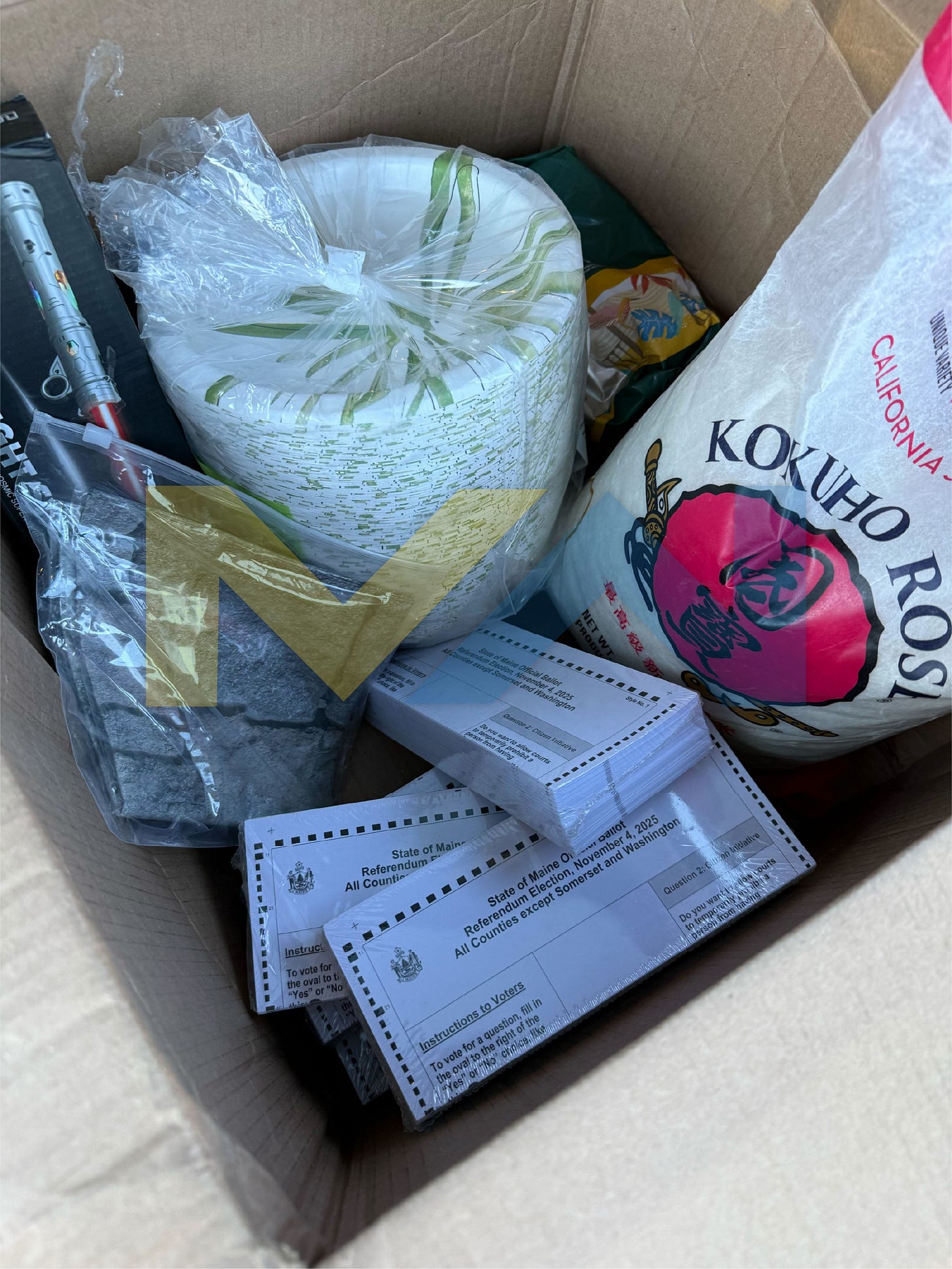
A resident of Newburgh, Maine, received an unusual order from Amazon on Tuesday: a bag of rice, some paper plates, a lightsaber toy for her child, and 250 authentic State of Maine election ballots printed in advance of the Nov. 4, 2025, statewide election.
The Amazon package that arrived containing the ballots appeared beat-up and bore signs of having been re-taped, as if someone had opened the package, inserted the ballots, and then re-applied the package tape.
The ballots resemble the format of authentic Maine ballots and are packaged in tamper-evident batches of 50 ballots, just like the bundles typically shipped to municipal election officials. Multiple election officials who reviewed the images prior to publication of this story confirmed that the images appear to show authentic 2025 Maine ballots.
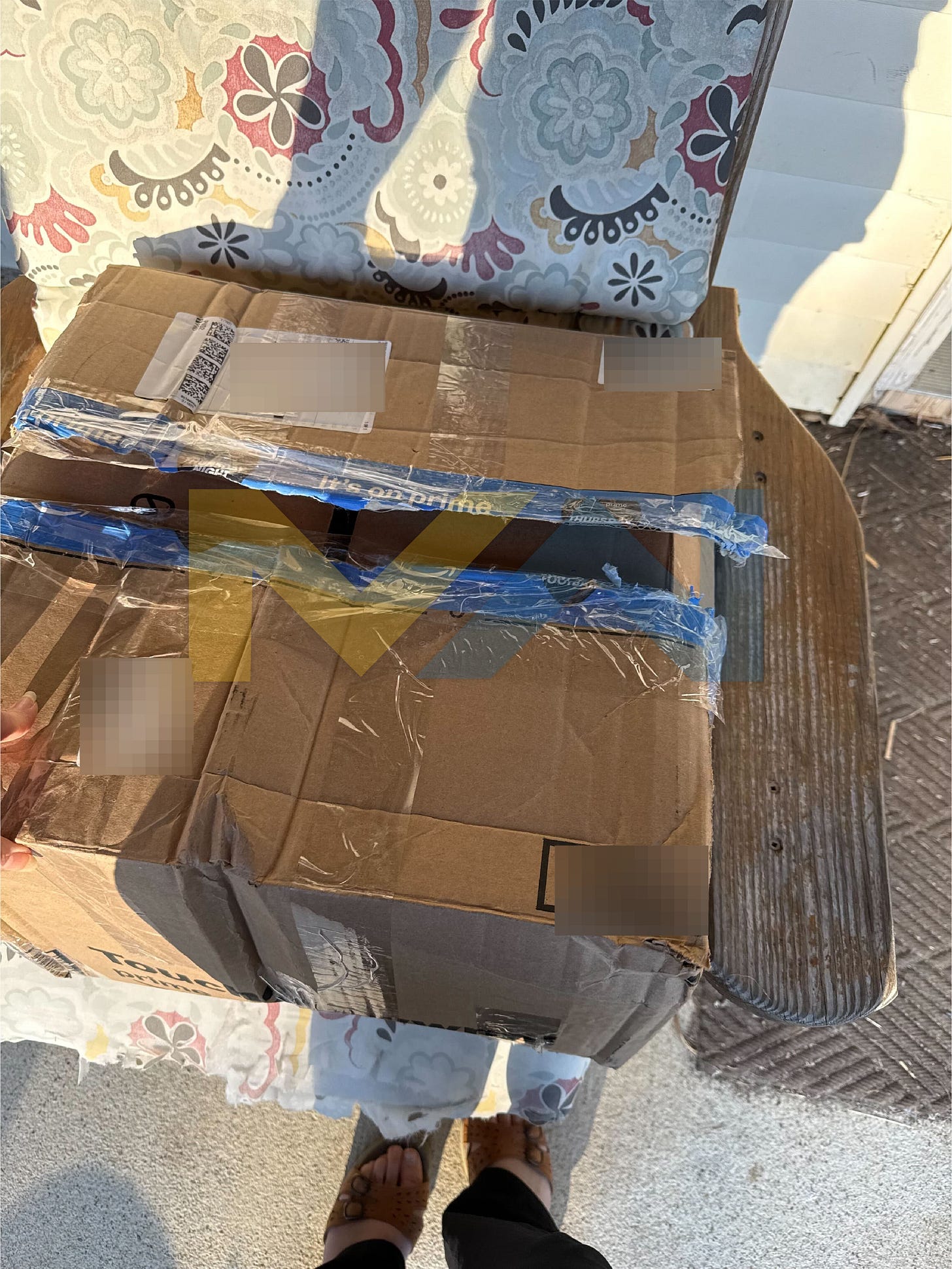
The resident who discovered the misappropriated ballots was shocked to see them amidst her anticipated Amazon order and quickly offloaded them at the local town office.
“I am greatly concerned for our state and its voting requirements,” she said. “Today I received a rather beat-up package with my mail. When I opened it, there were 250 official State of Maine referendum ballots inside my box. Thank goodness I am an honest citizen and immediately reached out to my town clerk and took the ballots to the town for safekeeping.”
Although the off-year election comes one year before the major 2026 election cycle, it is nonetheless consequential for all future elections because of the high-stakes ballot referendum question that would bring Voter ID to Maine.
Question One on the Nov. 4 ballot, including all 250 copies mistakenly delivered to the Newburgh resident, asks voters whether they would like Maine to join the 36 states and virtually every European country in adopting rules that require voters to show identification before casting a ballot.
The stakes of the 2025 election are high, with massive implications for future Maine elections, including the 2026 election in which Mainers will vote for the next governor, a U.S. senator, two members of the House of Representatives, every state legislative seat, and potentially more citizen initiatives.
Maine Democratic Party Chairman Charlie Dingman, a health care attorney based in Augusta, has said the Maine Democrats could lose more than 13,000 votes if Maine residents are required to prove their identities before casting ballots.
In a May 30 text message to voters, for example, Dingman said that if Maine adopted Voter ID requirements similar to those of 36 other states that “it could result in a loss of 13,000 Democratic” votes being counted in subsequent elections. (Dingman did not provide an explanation as to how the proposed Voter ID would prevent any legal U.S. citizen from voting in the election, nor did he elucidate how the Maine Democrats arrived at the 13,000 figure.)
If the Maine Democratic Party chairman is correct, though, then those 13,000 voters who will mysteriously disappear from the election tallies if IDs are required could reshape control of the state and even the U.S. Congress.
With the stakes so high, the epic blunder in Newburgh will only cast more doubt on the legitimacy of Maine’s elections, as well as the conduct of arch-partisan Shenna Bellows, a lifelong leftist activist who is currently seeking the Democratic nomination to run for governor in 2026.
“The possibility that valid Maine voting ballots may have ended up in the hands of an unwitting recipient is beyond the realm of accidental. This incident should be treated as a potential crime and a crime scene,” said Deyermond.
Subscribe to The Robinson Report for the rest of the story and all of Steve’s investigative reports. Most reports are totally free!
Maine Republican Party Chairman Jim Deyermond, a retired longtime Massachusetts State Trooper, said that the ballots, if they are authentic, should compel the U.S. Department of Justice to immediately assume control of the investigation into how they arrived at a private citizen’s home in violation of virtually every law, regulation, and rule governing Maine’s elections.
“The U.S. Department of Justice needs to assume jurisdiction over this matter immediately,” Deyermond told The Robinson Report.
“The possibility that valid Maine voting ballots may have ended up in the hands of an unwitting recipient is beyond the realm of accidental. This incident should be treated as a potential crime and a crime scene,” said Deyermond.
Under Maine state law, the Secretary of State’s Office, via the Bureau of Corporations, Elections and Commissions, designs the statewide ballots, keeps the format uniform across municipalities, and prepares both official and sample ballots. The required elements of the ballot are set by statute or determined by the Secretary of State’s Office, and the partially visible portions of the ballots seen in the Newburgh photographs appear to resemble authentic ballots.
In one of the images showing a sealed bundle of 50 ballots, the language for a second citizen initiative — Question Two, regarding a gun control measure — can clearly be seen. The partial language in the photographed ballot bundle is identical to the image that will appear on legitimate ballots.
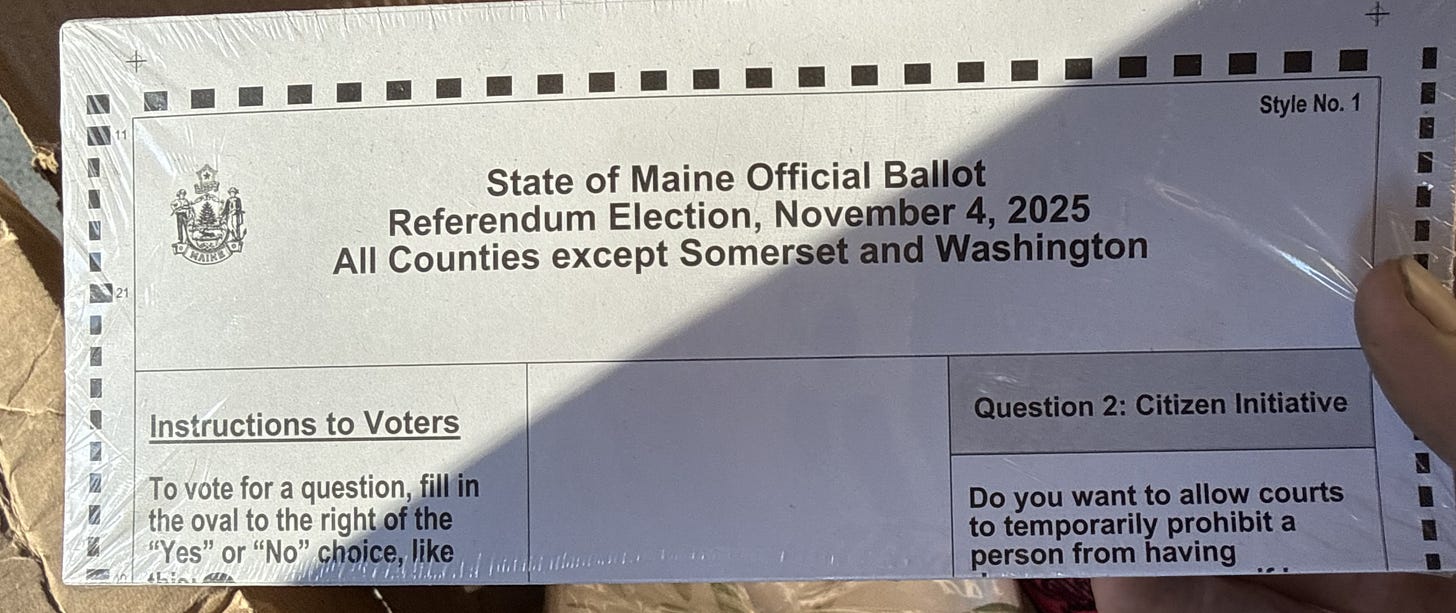
According to the Secretary of State’s website, the final language for that question will be:
“Do you want to allow courts to temporarily prohibit a person from having dangerous weapons if law enforcement, family, or household members show that the person poses a significant danger of causing physical injury to themselves or others?”
The mistaken delivery of 250 ballots to a seemingly random Maine voter via an Amazon package raises startling concerns about election security and the integrity of Maine’s elections 35 days prior to Election Day.
The resident, whom The Robinson Report is declining to name, has signaled a willingness to cooperate with federal law enforcement to turn over the remaining evidence she possesses of the potentially illegal shipment of election materials.
The resident lives several miles from the Newburgh town office, her address bears no similarity whatsoever to the address of the Newburgh town office, and Amazon has not historically been entrusted with the delivery of ballots.
Indeed, the arrival of the ballots implies that nearly every aspect of the ballot preparation process, which is stipulated by state law, long-standing Secretary of State’s office rules, and contracts with vendors, was brazenly disregarded.
The Robinson Report can only grow with your help! Share our stories on Facebook, X, by email, and everywhere else!
The citizen who received the package was so concerned with the mistaken delivery of genuine election ballots that she immediately contacted the Newburgh town office and delivered the ballots into their custody. She said a video recording was made of the ballots being placed into the town of Newburgh safe under the observation of the town’s deputy clerk, Rebecca Campbell.
Neither Campbell nor the Newburgh Town Manager, Katie Flores, were immediately available to respond to inquiries about the ballot shipment error and the process for handling the suspect election materials. Under state law, those ballots must be discarded.
Yet the question remains: If 250 ballots were mistakenly shipped to a private resident, how many other ballots have been distributed to unauthorized persons across the state, and will those ballots wind up being cast in various locations throughout the state?
According to the Newburgh resident who now owns a lightsaber and several months’ worth of white rice, Campbell said she would alert “state election officials” on Wednesday. Meaning Secretary of State Shenna Bellows will likely be tapped for damage control, if she hasn’t been already.
Maine Ballot Procedures: How it’s supposed to work…Under Maine law, ballots must be printed on secure paper, labeled for specific voting districts, and furnished in sealed, tamper-evident packages. Since the LePage Administration, the front end of this process has been handled by a contractor based in Omaha, Nebraska, though Secretary Bellows has enlisted other vendors for election-related activities, such as Electronic Registration Information Center (ERIC) and The Atlas Group d/b/a Technology Solutions of Maine, which has primarily served to clean ballot scanning equipment.
Once ballots are printed, the United States Postal Service and designated shipping companies, like UPS or FedEx, are authorized to transport blank ballots. Maine law states that the Secretary of State “shall furnish each municipality” with blank ballots, and the chain-of-custody typically runs direct from the printing vendor to the municipal office. Maine statute does not prevent the Secretary of State’s office from serving as a central hub or clearing house for ballot delivery, but, in practice, blank ballots are not typically processed through the office as a central hub or clearing house.
After ballots reach the municipal level, there are strict rules governing who can handle those ballots at the municipal level, typically only the municipal clerk or their designees. While the blank ballots are in municipal custody, they must be kept under continuous physical custody and may not be left unattended while unsecured. The ballots must remain sealed in labeled containers with tamper-evident seals, and the breaching of any seal requires immediate reporting to the Secretary of State. Unauthorized persons are usually not allowed to even handle the blank ballots, and signed documents are required to ensure documented chain-of-custody exists in the event of mistakes or subsequent investigations.
In terms of packaging ballots, Maine law states the following: “The ballots must be bundled and sealed in units as determined by the Secretary of State. Each package to be shipped must be labeled on the outside with the name of the municipality for which it is intended and indicate that it contains state ballots. If the municipality has more than one voting place or voting district, then each package of ballots for election day must be labeled on the outside to indicate the voting place or voting district for which it is intended.”
The arrival of 250 ballots at a private citizen’s address, tucked away into an Amazon package between a kids toy and pantry goods, raises a host of alarming questions about Maine’s Nov. 4 election, the integrity of the voting system, the potential abuse of ballot drop box locations, as well as the potential that hundreds, thousands, tens of thousands, or really any number of unaccounted for ballots were distributed to individuals.
The mere presence of the ballots in an unauthorized shipment, delivered by an unauthorized carrier, and received by an individual other than an authorized municipal town clerk suggests a breach of multiple state statutes related to the conduct of elections, as well as a complete breakdown in the chain-of-custody process for keeping the ballots protected and secure.
Under state law, the Secretary of State’s Office is required to keep precise records of when and how ballots are delivered to town offices. The law states: “The Secretary of State shall keep a record of the time when and the manner in which the ballots were furnished to each municipality.”
The Secretary of State’s office did not immediately respond to inquiries related to the botched shipment of ballots. (Note: The inquiry was made to Bellows’s taxpayer-funded press secretary, Emily Cook, who is paid at the level of a Deputy Secretary of State while serving primarily as a communications director and an assistant to Bellows’ gubernatorial campaign.)
The Hyper-Partisan, Power-Hungry, Camera-Chasing Election ChiefIn ordinary circumstances, the bizarre shipment of 250 blank ballots via Amazon to a private residence could be brushed aside as a logistical mistake or an innocent error. But Maine finds itself in extraordinary times with a Secretary of State who, in a striking break with bipartisan historical precedent, has embraced extreme left-wing partisanship with uncommon vigor.
As an example of Bellows’s extreme partisanship and penchant for seeking the limelight, she garnered national attention when she attempted an unconstitutional maneuver to remove President Donald Trump from Maine’s 2024 presidential ballots. That brief foray into national politics saw Bellows chasing interviews with CNN, MSNBC, NPR, and pretty much any left-wing platform interested in hearing her repeat the same talking points. But it was just a high-profile example of a sustained willingness to leverage her office to advance left-wing progressivism — and her own career.
Documents obtained via the Freedom of Access Act from the Secretary of State’s office, and previously reported on by The Robinson Report, show that Secretary Bellows took regular monthly meetings with a cadre of Maine’s far-left activist groups, many of them funded by Democratic mega donor George Soros.
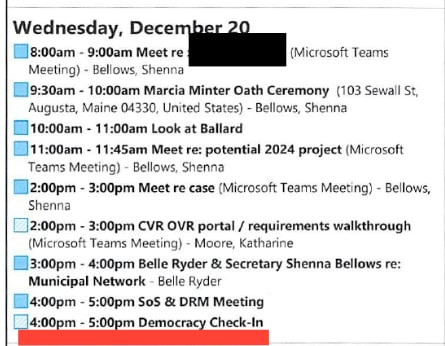
Those group meetings — described on Bellows’ calendar as “Democracy Check-In” — included the controversial League of Women Voters of Maine, a group that has explicitly discussed advocating non-citizen voting at events attended by Bellows, as well as other professional leftists dedicated to securing election advantages for the Democratic Party.
Bellows has also partnered with or been endorsed by multiple groups that fall under the Arabella Advisors’ umbrella of left-wing dark money groups, including the Maine People’s Alliance / Maine People’s Resource Center, the Committee for Ranked Choice Voting, Election Infrastructure-Information Sharing and Analysis Center (EI-ISAC), the Election Assistance Commission, Maine Won’t Discriminate, AltAcadia National Park, the American Democracy Summit Network, Democracy Maine, Mainers for Modern Elections, the ACLU of Maine, Maine Citizens for Clean Elections, Maine Conservation Voters, RepresentUs, Maine Equal Justice Partners, and Indivisible.
Perhaps most controversially, Bellows was the first Maine election official to bring the Electronic Registration Information Center (ERIC) to Maine, which she did in Oct. 2021. While describing itself as “nonpartisan,” ERIC is a left-wing tool that helps Democratic Secretaries of State maximally exploit their access to vast troves of data to boost Democratic election performance.
Every 60 days, member states submit anonymized (in theory) voter registration data and motor vehicle records to ERIC. The left-wing group then cross-references that data with other record caches to generate reports on “eligible but unregistered” (EBU) individuals, requiring members to mail postcards at least every two years with registration instructions to encourage participation.
Bellows integrated ERIC into Maine’s Central Voter Registration (CVR) system redesign, enabling automatic voter registration at the Bureau of Motor Vehicles (BMV). In 2024, this yielded 20,042 automatic registrations.
After ERIC, Maine’s voter registration rate hit 92.4 percent of eligible voters, and turnout ranked #1 nationally in 2022 (#3 in 2024). However, inactive registrations rose sharply from 3,572 in 2020 to 216,035 in 2022, which critics attribute to ERIC’s EBU outreach.
ERIC has also played a pivotal role in Bellows’ Feb. 2024 decision to create an Online Voter Registration (OVR) system ahead of the 2024 presidential election. The OVR allows aspiring voters to register online while using BMV data and ERIC as a safeguard against potential fraud. To register online, registrants must supply some identity information, and, for validating U.S. citizenship, applicants must merely check a box attesting that they are, in fact, U.S. citizens. In 2024, nearly 13,000 new voters were registered using the ERIC OVR system.
The Justice Department Probes Maine’s Voting RollsAt the same time election officials find themselves navigating a new election-related blunder, the U.S. Department of Justice is suing Maine over Bellows’ refusal to turn over Maine’s voter rolls.
Maine, via its Secretary of State, is required to provide its voter rolls to the DOJ’s Civil Rights Division upon request under the National Voter Registration Act (NVRA), the Help America Vote Act (HAVA), and Title III of the Civil Rights Act of 1960 (CRA).
Bellows even admitted that the U.S. DOJ’s Civil Rights Division has cause to examine Maine’s voter rolls in an Aug. 7 podcast interview with a left-wing activist, Marc Elias, whom Bellows’ gubernatorial campaign has paid at least $12,000, according to Maine campaign finance disclosures.
“I’m sure there are, um, in some isolated instances, some non-citizens maybe on the rolls,” Bellows said. Prior to that admission, Bellows had mocked evidence that non-citizens were voting in Maine’s elections as right-wing conspiracy theories.
In response to the Civil Rights Division’s requests for data, Bellows has, at least three times now, attempted the same joke to defend her decision to withhold the voter records, telling Trump’s DOJ to go jump in the Gulf of Maine.
Assistant Attorney General Harmeet Dhillon, the head of the Civil Rights Division and the probe into Bellows’ handling of Maine’s elections and voter rolls, isn’t laughing.
“States simply cannot pick and choose which federal laws they will comply with, including our voting laws, which ensure that all American citizens have equal access to the ballot in federal elections,” Dhillon said in a statement.
“American citizens have a right to feel confident in the integrity of our electoral process, and the refusal of certain states to protect their citizens against vote dilution will result in legal consequences,” Dhillon said. (A full copy of the DOJ suit against Maine can be found here.)
Dhillon was not immediately available to comment on the mysterious appearance of 250 Maine ballots at a random voter’s home.
In addition to reusing her joke about the Gulf of Maine, Bellows has maintained that ERIC, the left-wing nonprofit that helps Democratic secretaries of state boost Democratic voter turnout, is an acceptable election integrity alternative to the Justice Department.
Rep. Barbara Bagshaw (R-Windham) has urged U.S. Attorney General Pam Bondi to investigate Bellows for prioritizing ERIC over DOJ requests, calling it “fraud, waste, and abuse.”
Adding yet more complexity, Bellows has refused to resign from her taxpayer-funded job as Secretary of State even as she spends the majority of her working hours campaigning for the Democratic gubernatorial nomination. That means she will administer not only the upcoming 2025 election, in which ballots seem to be manifesting themselves in odd locations, but also the 2026 primary and general elections, both of which could include her as a Democratic candidate.
Further, Bellows has been strikingly more partisan than her predecessors when it comes to making commentary and using her office to campaign in favor or against statewide ballot initiatives.
Bellows has also been accused, with good reason, of using the Secretary of State’s office to craft ballot initiative question language, such as this year’s Voter ID question (Question One) in a manner that confuses voters and makes her preferred, partisan outcome more likely.
For the record, Question One’s most significant change would be to require voters to show a valid form of ID when voting, but the citizens initiative, which garnered more signatures than any citizen initiative in Maine history, will be phrased as follows:
Who Printed and Shipped the Ballots?Do you want to change Maine election laws to eliminate two days of absentee voting, prohibit requests for absentee ballots by phone or family members, end ongoing absentee voter status for seniors and people with disabilities, ban prepaid postage on absentee ballot return envelopes, limit the number of drop boxes, require voters to show certain photo ID before voting, and make other changes to our elections?”
The question of who printed and shipped the mysterious Newburgh ballots is as yet unanswered, but contract documents from the Secretary of State’s office offer some clues.
Maine’s election laws provide firm rules for how ballots are supposed to be handled once they are cast, but the rules around handling blank ballots are set in contracts between the Secretary of State’s office and the election vendor.
Typically, when the state of Maine is soliciting goods or services — such as the printing of ballots — the state will issue a “Request for Proposals” or RFP, which begins a transparent competitive bidding process where potential vendors compete to offer a given service for the lowest price.
RELATED:Mills’ Millions: Maine Taxpayers Foot Bill for Absurd No-Bid Contracts
Bangor Newspaper Company Has Received More Than $2.4M from Mills Admin for “Public Affairs”
VIDEO: Inside the State Auditor’s Bombshell Report on No-Bid Contracts
In the case of Maine’s 2025 election ballots, however, Secretary Bellows instead issued a Notice of Intent to Waive Competitive Bidding, or NOI, which allowed the office to avoid competitive bidding and instead issue the ballot printing contract to Election Systems & Software, LLC (ES&S) of Omaha, Nebraska. According to state documents, the company is responsible for “printing, packaging and delivery of official and sample ballots for the 11/4/25 Referendum Election.”
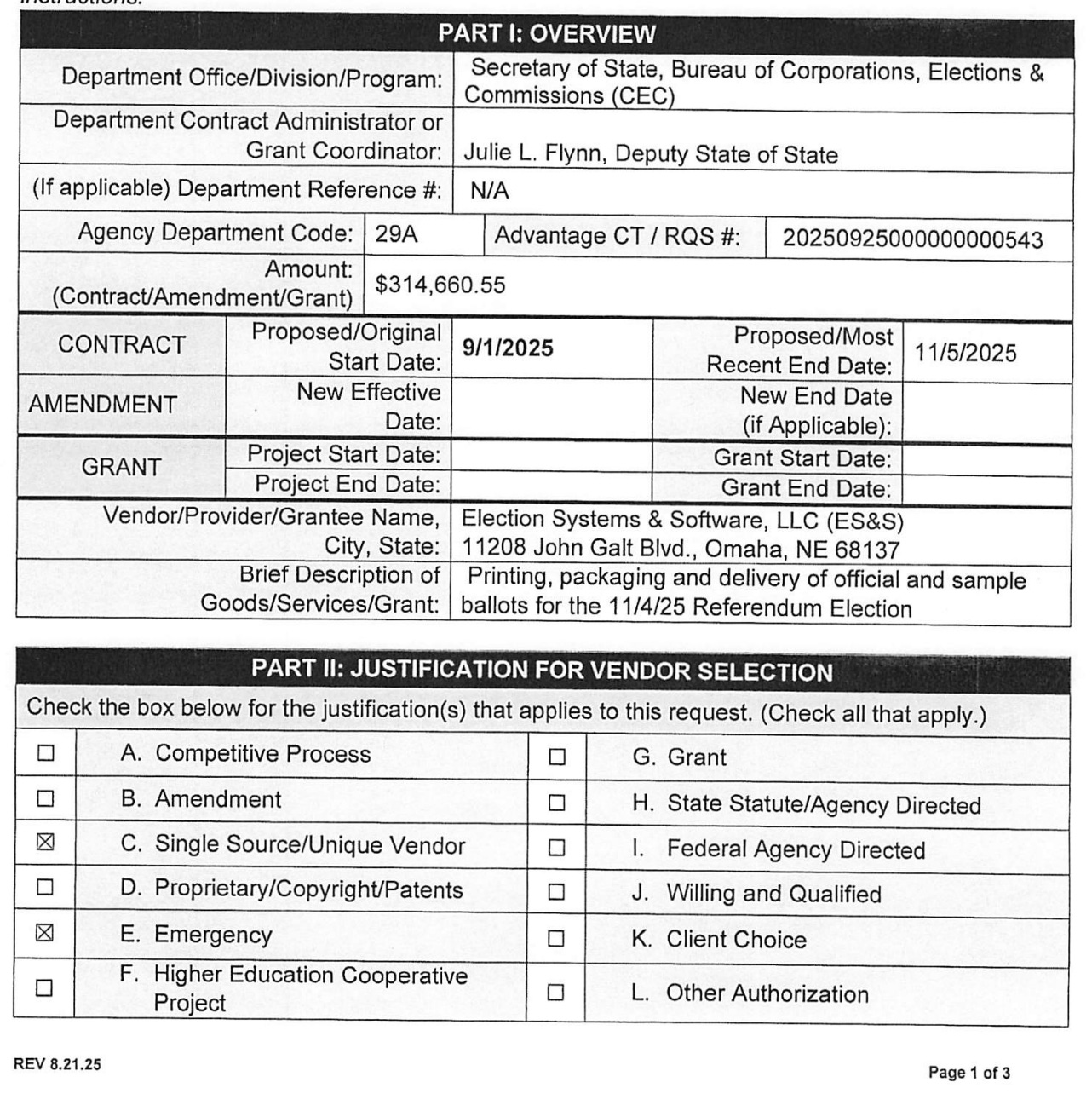
In the Procurement Justification Form (PJF) the Secretary of State’s office used to justify circumventing the competitive process, the office listed ES&S as a unique vendor and indicated that the contract was being initiated on an emergency basis.
The “emergency” nature of the no-bid contract and seemingly abrupt timing is likely the result of pre-existing contractual relationships which require the state to use ES&S — or a printer ES&S selects — for election services, including the printing and shipping of additional ballots.
Maine election officials first used the company in 2012 under a seven-year lease that has since been extended to Dec. 31, 2025. The PJF for this year’s ballot printing articulates that Maine’s agreement with ES&S stipulates that the state is required to use a ballot printer authorized by the firm; however, that ballot printing firm is not named in the PJF document.
“In entering the agreement with ES&S, the Bureau understood it would be required to utilize the vendor’s services (or those of a partner printer authorized by the vendor) to print ballots that work with its proprietary system,” the PJF states.
The PJF does not state whether ES&S used a partner printer to handle Maine’s 2025 ballot, nor does it state who that partner might have been.
The Robinson Report has submitted inquiries to both ES&S and Bellows to discern what other hitherto unnamed companies might have had a hand in the erroneous shipment of the Newburgh ballots.
You’ll never find journalism like this with the taxpayer-funded liberal media. So why not support The Robinson Report and the Maine Wire by subscribing, sharing our content, offering generous financial support? Send me an email if you’re interested in helping us keep Mainers informed.